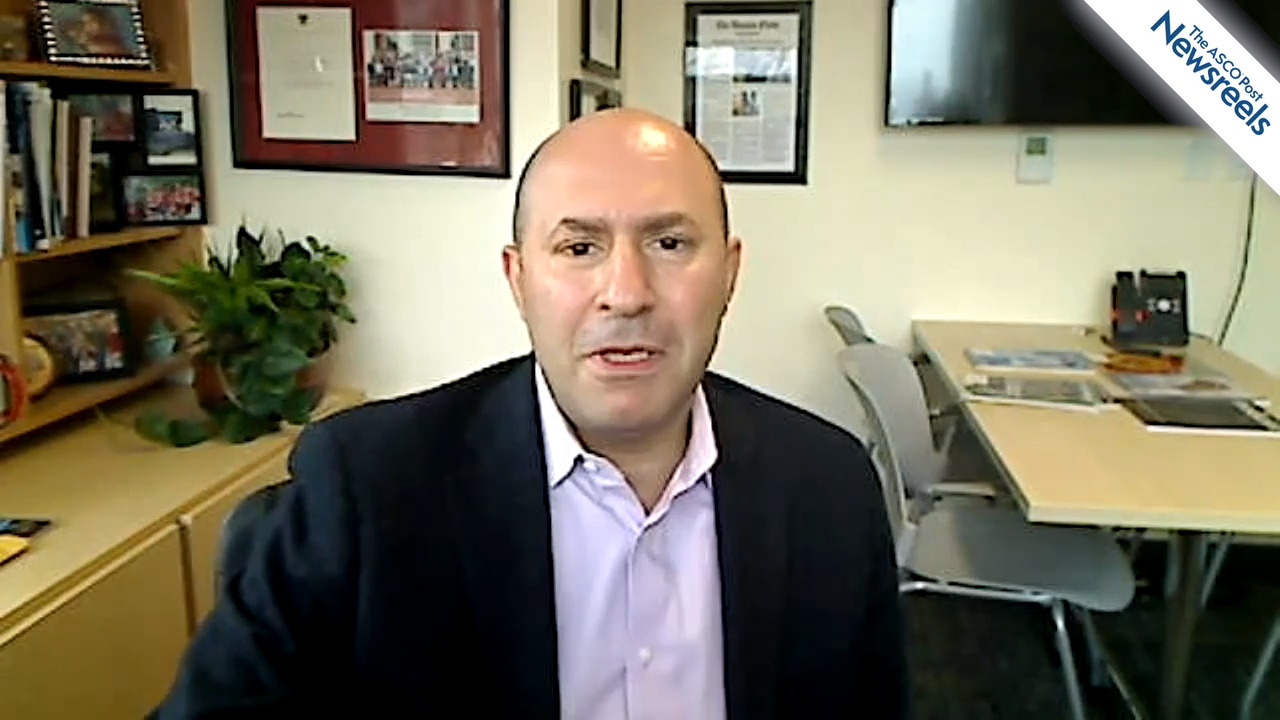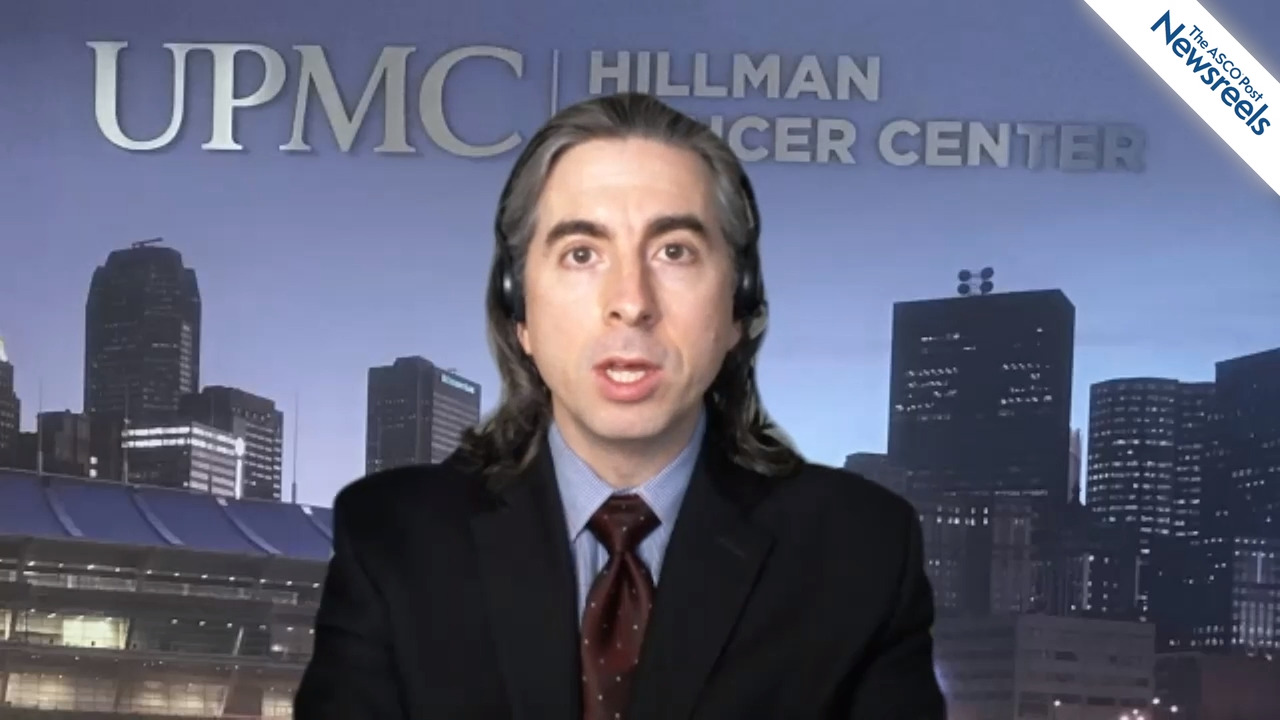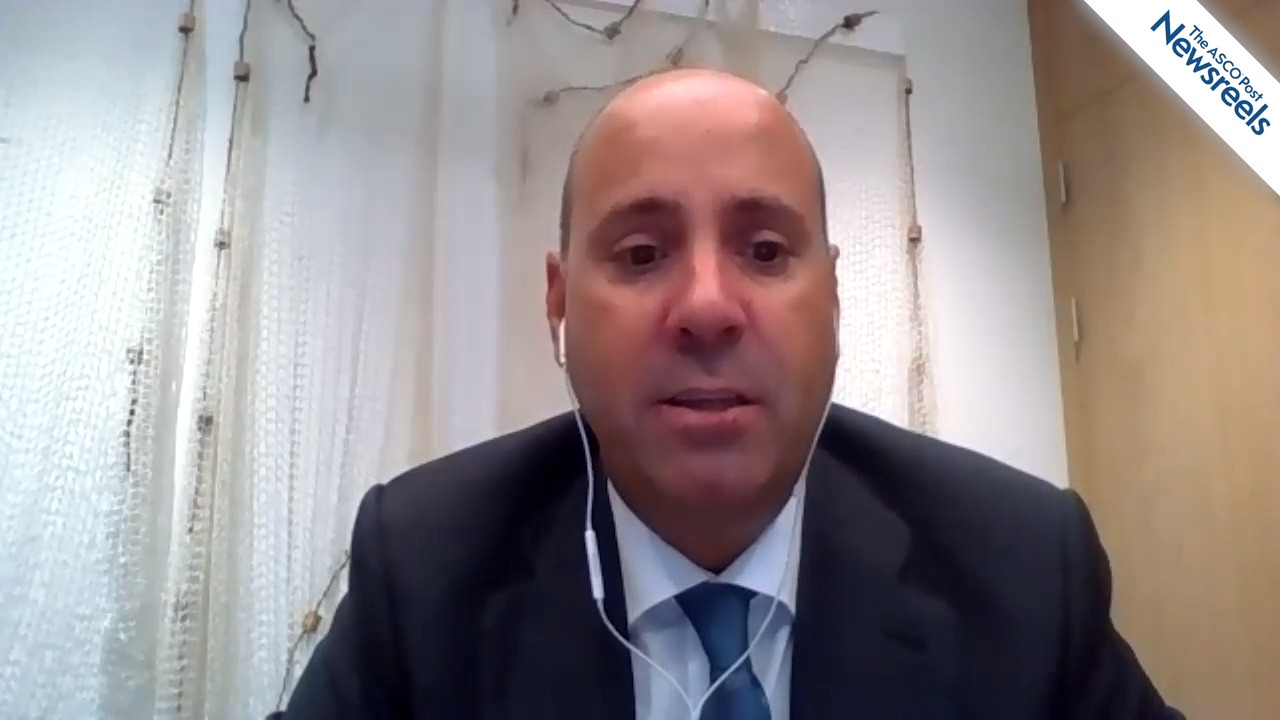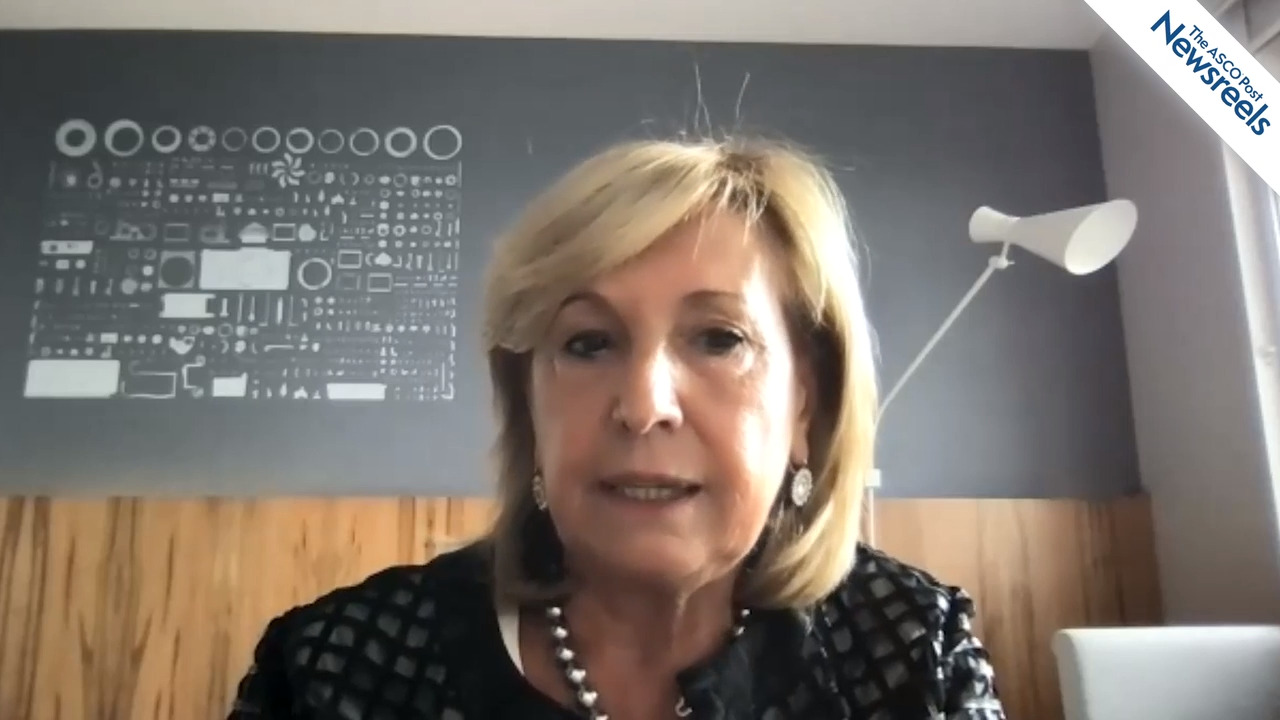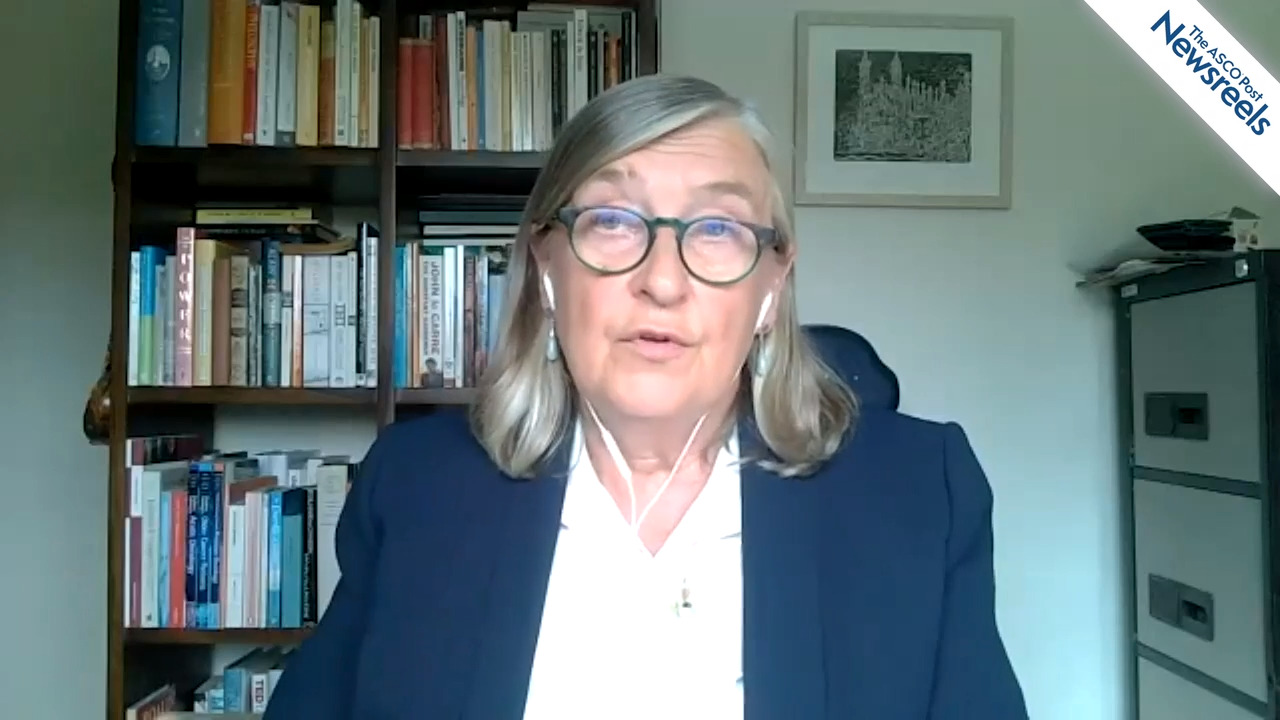Naveen S. Vasudev, PhD, MBChB, on RCC: Changing the Dosing Schedule of Ipilimumab Plus Nivolumab
Naveen S. Vasudev, PhD, MBChB, of the University of Leeds, discusses phase II results from the PRISM trial, which showed that giving ipilimumab every 12 weeks instead of every 3 weeks, in combination with nivolumab, led to lower rates of grade 3 and 4 toxicities in patients with advanced renal cell carcinoma. Efficacy appeared to be comparable between both arms (Abstract LBA29).
DESTINY-Lung01: Fam-trastuzumab Deruxtecan-nxki in Previously Treated HER2-Mutant NSCLC
In the phase II DESTINY-Lung01 trial, presented at the European Society for Medical Oncology (ESMO) Congress 2021 (Abstract LBA45) and concurrently reported in The New England Journal of Medicine, Bob T. Li, MD, PhD, MPH, and colleagues found that fam-trastuzumab deruxtecan-nxki produced durable...
COSMIC-021: Cabozantinib Plus Atezolizumab for Advanced Renal Cell Carcinoma
In the phase Ib COSMIC-021 trial reported in the Journal of Clinical Oncology, Sumanta K. Pal, MD, FASCO, and colleagues found that the combination of cabozantinib and atezolizumab produced durable responses in patients with advanced renal cell carcinoma (RCC). Study Details One hundred and two...
Addition of Ramucirumab to Gemcitabine in Second-Line Treatment of Malignant Pleural Mesothelioma
In the Italian phase II RAMES trial reported in The Lancet Oncology, Pinto et al found that the addition of ramucirumab to gemcitabine improved overall survival in the second-line treatment of malignant pleural mesothelioma. As noted by the investigators, “There is a preclinical rationale for...
FDA Grants Accelerated Approval to Tisotumab Vedotin-tftv for Recurrent or Metastatic Cervical Cancer
On September 20, the U.S. Food and Drug Administration (FDA) granted accelerated approval to tisotumab vedotin-tftv (Tivdak), a tissue factor–directed antibody and microtubule inhibitor conjugate, for adult patients with recurrent or metastatic cervical cancer who experienced disease progression on ...
Toni K. Choueiri, MD, on Renal Cell Carcinoma: Quality-of-Life Data From KEYNOTE-564 on Pembrolizumab vs Placebo
Toni K. Choueiri, MD, of Dana-Farber Cancer Institute, discusses patient-reported outcomes for quality of life in the KEYNOTE-564 study, which previously met its primary endpoint of disease-free survival with adjuvant pembrolizumab vs placebo following surgery for renal cell carcinoma (Abstract 653O).
Adjuvant Pembrolizumab for High-Risk Stage II Melanoma: Efficacy and Safety Examined
Adjuvant pembrolizumab reduced the risk of disease recurrence in adults and children aged 12 years and older with high-risk stage II melanoma vs placebo, according to a late-breaking interim analysis of the phase III KEYNOTE-716 trial presented by Jason J. Luke, MD, and colleagues at the European...
Bispecific Antibody Epcoritamab in Relapsed or Refractory B-Cell Non-Hodgkin Lymphoma
In a phase I/II study reported in The Lancet, Hutchings et al found that the novel bispecific antibody epcoritamab produced high response rates in patients with relapsed or refractory B-cell non-Hodgkin lymphoma. Epcoritamab works by targeting CD3 and CD20 and inducing T-cell–mediated cytotoxic...
Jason J. Luke, MD, on Melanoma: KEYNOTE-716 Trial of Pembrolizumab vs Placebo
Jason J. Luke, MD, of UPMC Hillman Cancer Center, discusses phase III results showing that adjuvant pembrolizumab for patients with resected stage IIB and IIC melanoma decreased the risk of disease recurrence or death by 35% compared with placebo. It was also associated with significantly prolonged recurrence-free survival (Abstract LBA3).
Javier Cortés, MD, PhD, on HER2-Positive Breast Cancer: Trastuzumab Deruxtecan vs Trastuzumab Emtansine
Javier Cortés, MD, PhD, of Barcelona’s IOB Institute of Oncology, discusses phase III data from the DESTINY-Breast03 study, which support trastuzumab deruxtecan becoming the standard of care for second-line treatment of women with HER2-positive metastatic breast cancer (Abstract LBA1).
Nicoletta Colombo, MD, on Cervical Cancer: KEYNOTE-826 Trial of Pembrolizumab Plus Chemotherapy
Nicoletta Colombo, MD, of the Istituto Europeo Oncologico, discusses phase III results that showed improvements in progression-free and overall survival with a combination of pembrolizumab plus chemotherapy, compared with placebo and chemotherapy, for patients with persistent, recurrent, or metastatic cervical cancer. These benefits were seen regardless of PD-L1 expression and concomitant bevacizumab use, suggesting that pembrolizumab plus chemotherapy, with or without bevacizumab, may be a new standard of care for this population (Abstract LBA2).
DESTINY Breast03: Second-Line Fam-Trastuzumab Deruxtecan-nxki for Metastatic HER2-Positive Breast Cancer
Fam-trastuzumab deruxtecan-nxki (T-DXd) showed statistically significant improvement in progression-free survival vs trastuzumab emtansine (T-DM1) in second-line treatment for HER2-positive unresectable or metastatic breast cancer, according to results from the global phase III DESTINY-Breast03...
KEYNOTE-826: Pembrolizumab Plus Chemotherapy in Advanced Cervical Cancer
The addition of pembrolizumab to chemotherapy prolonged survival in recurrent, persistent, or metastatic cervical cancer, according to results of the KEYNOTE-826 study presented at the European Society for Medical Oncology (ESMO) Congress 2021 by Nicoletta Colombo, MD, and colleagues (Abstract...
DESTINY-Gastric02: Fam-Trastuzumab Deruxtecan-nxki Produces Responses in Patients With HER2-Positive Gastric Cancers
In the primary analysis of the phase II DESTINY-Gastric02 trial, fam-trastuzumab deruxtecan-nxki (T-DXd) produced clinically meaningful and durable responses in Western patients with advanced HER2-positive gastric or gastroesophageal junction cancers whose disease had progressed after a...
Helena M. Earl, MBBS, PhD, on HER2-Positive Early Breast Cancer: A Meta-analysis of Trastuzumab Trials
Helena M. Earl, MBBS, PhD, of the University of Cambridge, discusses an individual patient data meta-analysis of noninferiority randomized clinical trials to determine whether a duration of less than the standard of 12 months of adjuvant trastuzumab is noninferior for treatment outcomes in patients with HER2-positive early breast cancer (Abstract LBA11).
Can Diabetes Affect the Efficacy of Immune Checkpoint Inhibitors in Patients With Advanced Cancer?
Investigators from 22 institutions aimed to evaluate the impact of diabetes mellitus in a retrospective cohort of patients with advanced cancer treated with a single-agent immune checkpoint inhibitor. In a report presented by Cortellini et al at the European Society for Medical Oncology (ESMO)...
Expert Point of View: Carol Aghajanian, MD
“The phase III ENGOT/GCIG study1 proved to be negative, with no advantage seen with the extension of bevacizumab treatment,” said the abstract’s invited discussant, Carol Aghajanian, MD, Chief of the Medical Gynecologic Oncology Service at Memorial Sloan Kettering Cancer Center, New York. Dr....
Bevacizumab in Advanced Ovarian Cancer: Phase III Trial Finds More Is Not Better
In advanced ovarian cancer, the duration of maintenance bevacizumab should remain 15 months, according to the European multicenter phase III ENGOT/GCIG trial. These results were presented during the 2021 ASCO Annual Meeting by Jacobus Pfisterer, MD, PhD, of the AGO Study Group and Gynecologic...
Expert Point of View: Ana Oaknin, MD, PhD
The innovaTV 204 trial’s invited discussant, Ana Oaknin, MD, PhD, Head of the Gynecologic Cancer Program at Vall d’Hebron Institute of Oncology in Barcelona, was encouraged by the study’s findings. “Of note, the response rate was 24%, the time to response was short, and the median duration of...
Novel Treatments Show Activity in Advanced Cervical Cancer
The treatment of recurrent or metastatic cervical cancer has not changed much in recent years, but according to preliminary trials presented at the European Society for Medical Oncology (ESMO) Virtual Congress 2020, checkpoint inhibitors and antibody-drug conjugates may become new options. In the...
Expert Point of View: Mansoor Raza Mirza, MD
The invited discussant of EMPOWER-Cervical 1 was Mansoor Raza Mirza, MD, Chief Oncologist at Copenhagen University Hospital and Chairman of the European Network of Gynaecological Oncology Trials group (ENGOT). Dr. Mirza called the findings “amazing” and predicted they will “usher in a new era” in...
Immunotherapy With Cemiplimab-rwlc Yields Survival Benefit in Advanced Cervical Cancer
The PD-L1 inhibitor cemiplimab-rwlc has become the first immunotherapy to yield a statistically significant and clinically meaningful survival benefit in recurrent or metastatic cervical cancer progressing after first-line platinum-containing chemotherapy. Patients were enrolled irrespective of...
Gynecologic Cancers 2020–2021 Almanac
The past year has been a remarkable and noteworthy time with much exciting progress made in gynecologic cancers, despite the underlying presence of the COVID-19 pandemic. Several key studies were presented in 2020–2021 that detailed the results of novel therapies for our patients with cervical,...
Atezolizumab Reduces Risk of Disease Progression in Patients With PD-L1–Expressing Early-Stage NSCLC
Atezolizumab given after chemotherapy to patients with resected stage II to IIIA non–small cell lung cancer (NSCLC) significantly improved disease-free survival compared with best supportive care alone in patients whose tumors expressed PD-L1.1 These results of the global phase III IMpower010 trial ...
Atezolizumab Plus Chemotherapy in Patients With Advanced NSCLC and Brain Metastases
Patients with advanced non–small cell lung cancer (NSCLC) and brain metastases derived benefit from treatment with atezolizumab plus chemotherapy, according to findings from the multicenter phase II ATEZO-BRAIN/GECP 17/05 trial. The study was presented at the International Association for the Study ...
Nivolumab vs Gemcitabine or Pegylated Liposomal Doxorubicin: What Regimen Improves Survival in Platinum-Resistant Ovarian Cancer?
In a Japanese phase III trial (NINJA) reported in the Journal of Clinical Oncology, Hamanishi et al found that nivolumab did not improve overall survival vs chemotherapy with either gemcitabine or pegylated liposomal doxorubicin in platinum-resistant epithelial ovarian cancer. Study Details In the...
Prasad S. Adusumilli, MD, on CAR T-Cell Therapy for Mesothelioma
Prasad S. Adusumilli, MD, of Memorial Sloan Kettering Cancer Center, discusses phase I/II research he is conducting on CAR T cells delivered intrapleurally in patients with mesothelioma. The treatment is targeting mesothelin, a cancer cell-surface antigen overexpressed in many solid tumors and associated with aggressive disease (Abstract PL05.01).
Neoadjuvant Atezolizumab Under Study for Resectable Pleural Mesothelioma
Neoadjuvant atezolizumab combined with pemetrexed and cisplatin, followed by surgical resection and maintenance atezolizumab, proved safe and feasible and offered hints of benefit in patients with resectable pleural mesothelioma. Results from a small multicenter study were presented by Boris...
Maintenance Durvalumab: Increased Utilization Could Improve NSCLC Outcomes
Maintenance durvalumab—the recommended maintenance treatment for patients with unresectable stage III non–small cell lung cancer (NSCLC) following chemoradiation—remains significantly underutilized, according to research presented by Liu et al at the International Association for the Study of Lung...
AUTO1: CAR T-Cell Product for Adult Patients With Relapsed or Refractory B-Cell ALL
In a phase I trial (ALLCAR19) reported in the Journal of Clinical Oncology, Roddie et al found that the fast off-rate autologous CD19 chimeric antigen receptor (CAR) T-cell therapy CAT19-41BB-Z—also known as AUTO1—was well tolerated and produced high remission rates in adults with relapsed or...
POSEIDON Trial: Dual Checkpoint Blockade Plus Chemotherapy Improves Survival in First-Line Metastatic NSCLC
Findings from the phase III POSEIDON trial showed significantly improved progression-free and overall survival in patients with metastatic non–small cell lung cancer (NSCLC) who received first-line durvalumab and tremelimumab plus chemotherapy vs chemotherapy alone. These findings were presented by ...
IMpower010 Study of Atezolizumab in Resectable NSCLC: Benefits Observed Regardless of Stage, Type of Prior Treatment
In an exploratory analysis of the pivotal phase III IMpower010 trial—which found that adjuvant atezolizumab significantly improved disease-free survival in resectable non–small cell lung cancer (NSCLC)—benefit was shown regardless of the type of surgery or the chemotherapy doublet received by the...
Technology-Enabled Monitoring of Adverse Reactions to Immune Checkpoint Inhibitors
In an interim analysis of a single-institution study reported in JAMA Network Open, Pavlos Msaouel, MD, PhD, and colleagues found that the use of a mobile device application for patient reporting of adverse reactions to immune checkpoint inhibition was feasible. It permitted identification of...
Treatment of Relapsed Myeloma: Options Include New Drugs, Novel Combinations
The treatment paradigm for multiple myeloma continues to evolve at a rapid pace with the introduction of new drugs and the development of drug combinations, particularly the initial approach to the treatment of newly diagnosed multiple myeloma.1 One major shift in the treatment of newly diagnosed...
Subcutaneous Daratumumab Added to Pomalidomide Plus Dexamethasone Improves Progression-Free Survival in Multiple Myeloma
As reported in The Lancet Oncology by Meletios A. Dimopoulos, MD, of the National and Kapodistrian University of Athens, and colleagues, the phase III APOLLO trial has shown significantly improved progression-free survival with the addition of subcutaneous (SC) daratumumab to oral...
Pembrolizumab Combined With Trastuzumab and Chemotherapy for HER2-Positive Gastric or Gastroesophageal Junction Adenocarcinoma
On May 5, 2021, pembrolizumab was granted accelerated approval for use in combination with trastuzumab and fluoropyrimidine- and platinum-containing chemotherapy for the first-line treatment of patients with locally advanced unresectable or metastatic HER2-positive gastric or gastroesophageal...
Pembrolizumab for High-Risk, Early-Stage Triple-Negative Breast Cancer
On July 26, 2021, pembrolizumab was approved for high-risk, early-stage, triple-negative breast cancer in combination with chemotherapy as neoadjuvant treatment and continued as adjuvant treatment.1 Pembrolizumab was also granted regular approval in combination with chemotherapy for locally...
Assumptions, Data … and More Questions!
I read with great interest the results from the phase II ZUMA-12 study of axicabtagene ciloleucel, presented during the 2020 American Society of Hematology (ASH) Annual Meeting & Exposition.1 But the results raised several questions for me. Axicabtagene ciloleucel, an autologous anti-CD19...
Biomarker Analysis Evaluates Potential for Immune Checkpoint Blockade Response in Older Patients With Cancer
A retrospective analysis of large data sets of biomarkers from tumors and healthy tissue by researchers at the Johns Hopkins Kimmel Cancer Center Convergence Institute suggests that older patients with cancer may benefit as much from cancer immunotherapies as younger patients. The findings,...
Several Studies Show Rovalpituzumab Tesirine Is Ineffective Against SCLC
Four independent studies published in the Journal of Thoracic Oncology demonstrate that rovalpituzumab tesirine (Rova-T), a first-in-class antibody-drug conjugate directed against delta-like protein 3 (DLL3), is not effective against small cell lung cancer (SCLC). An accompanying editorial by...
Phase II Trial Evaluates Oncolytic Coxsackievirus A21 for Unresectable Advanced Melanoma
In a phase II trial reported in the Journal of Clinical Oncology, Robert H.I. Andtbacka, MD, and colleagues found that intratumoral injection of the oncolytic RNA virus Coxsackievirus A21 (V937) was well tolerated and produced responses in some patients with unresectable stage III or stage IV...
Neoadjuvant Gemcitabine and Split-Dose Cisplatin Plus Pembrolizumab for Muscle-Invasive Bladder Cancer
In a phase II study reported in the Journal of Clinical Oncology, Tracy L. Rose, MD, MPH, and colleagues found that neoadjuvant therapy with pembrolizumab, gemcitabine, and primarily split-dose cisplatin resulted in pathologic downstaging (< pT2N0) in more than half of patients undergoing...
Pembrolizumab/Entinostat for Metastatic Uveal Melanoma
In the phase II PEMDAC study, researchers showed that the combination of the PD-1 inhibitor pembrolizumab and the histone deacetylase (HDAC) inhibitor entinostat resulted in durable responses in a small group of patients with metastatic uveal melanoma. These findings were published by Ny et al in...
FDA Revises Label for Pembrolizumab in Patients With Advanced Urothelial Carcinoma
On August 31, the U.S. Food and Drug Administration (FDA) revised the label for the anti–PD-1 therapy pembrolizumab for its indication in first-line advanced urothelial carcinoma. The FDA converted the indication from an accelerated approval to a full approval. In addition, as part of the label...
Evandro de Azambuja, MD, PhD, Comments on the BERENICE Trial
The invited discussant for the BERENICE trial was Evandro de Azambuja, MD, PhD, Head of the Medical Support Team at the Institut Jules Bordet in Brussels. He concluded from the study that pertuzumab plus trastuzumab, combined with an anthracycline/taxane regimen given every 2 weeks or every 3...
Safety, Efficacy of Neoadjuvant Pertuzumab Plus Trastuzumab Maintained in Final Analysis of BERENICE Trial
Long-term cardiac safety and efficacy have been confirmed for pertuzumab plus trastuzumab in patients with early breast cancer, in an update of the phase II BERENICE trial reported at the 2021 ESMO Breast Cancer Virtual Congress.1 Chau T. Dang, MD, of the Breast Medicine Service at Memorial Sloan...
Addition of Pembrolizumab to Chemotherapy for the First-Line Treatment of Advanced Esophageal Cancer: KEYNOTE-590
As reported in The Lancet by Sun et al, the phase III KEYNOTE-590 trial showed that the addition of first-line pembrolizumab to chemotherapy resulted in improved overall and progression-free survival in patients with advanced esophageal and Siewert type 1 gastroesophageal junction (GEJ) cancers....
Study Highlights Gaps Between Lung Cancer Treatment Recommendations and Real-World Use of Durvalumab
A recent study published by Ronden et al in JTO Clinical and Research Reports highlights the gap between treatment guidelines and real-world care with the monoclonal antibody durvalumab for patients with non–small cell lung cancer. Researchers studied treatment decision-making by three Dutch...
Update on U.S. Indication for Atezolizumab in PD-L1–Positive Metastatic Triple-Negative Breast Cancer
Genentech, a member of the Roche Group, announced that it has made the decision to voluntarily withdraw the U.S. accelerated approval for atezolizumab (Tecentriq) in combination with nab-paclitaxel for the treatment of adults with unresectable locally advanced or metastatic triple-negative breast...
Profile of Adverse Events Related to PD-1 and PD-L1 Inhibitor–Based Therapy
In a systematic review and meta-analysis reported in The Lancet Oncology, Zhou et al provided a profile of treatment-related adverse events observed in clinical trials combining PD-1 or PD-L1 inhibitors with chemotherapy, targeted therapy, immunotherapy, and radiotherapy. Study Details The...

